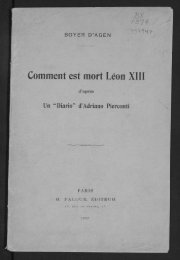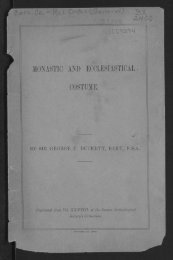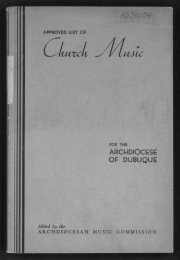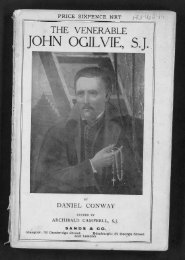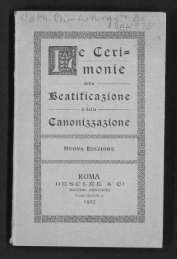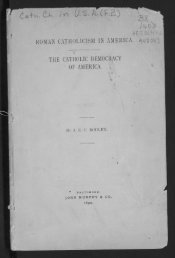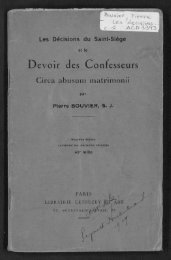Fabiola : or, The church of the catacombs - Digital Repository Services
Fabiola : or, The church of the catacombs - Digital Repository Services
Fabiola : or, The church of the catacombs - Digital Repository Services
Create successful ePaper yourself
Turn your PDF publications into a flip-book with our unique Google optimized e-Paper software.
On one side could be seen fa<strong>the</strong>rs and mo<strong>the</strong>rs weeping over <strong>the</strong><br />
dead bodies <strong>of</strong> <strong>the</strong>ir children, on <strong>the</strong> o<strong>the</strong>r, children inconsol-<br />
able f<strong>or</strong> <strong>the</strong> loss <strong>of</strong> <strong>the</strong>ir beloved parents. <strong>The</strong> m<strong>or</strong>ning sun rose<br />
in splend<strong>or</strong>, and <strong>the</strong> sparkling waters danced in his beams, as if<br />
rejoicing to meet again.<br />
What f<strong>or</strong>m is moving yonder on <strong>the</strong> heights? pale and slender,<br />
robed in white, enriched with <strong>the</strong> golden hues <strong>of</strong> <strong>the</strong> rising sun;<br />
bearing a broken chain on one arm, and a girdle on t lr o<strong>the</strong>r.<br />
It seems as though it were <strong>the</strong> guardian spirit <strong>of</strong> this once great<br />
city, mourning o'er its fall. Slowly and thoughtfully she passes<br />
on, till she reaches <strong>the</strong> still smoking ruins <strong>of</strong> <strong>the</strong> citadel. She<br />
pauses, and casting down her s<strong>of</strong>t dark eyes, surveys <strong>the</strong> desolation<br />
that lies bef<strong>or</strong>e her. <strong>The</strong> spectacle surprises her, but<br />
her mien betrays nei<strong>the</strong>r fear n<strong>or</strong> h<strong>or</strong>r<strong>or</strong>. Her expression is<br />
that <strong>of</strong> silent resignation to <strong>the</strong> will <strong>of</strong> Him, who makes <strong>the</strong> earth<br />
His footstool. She was roused from reverie by a voice exclaiming:<br />
"Seraphica here! <strong>The</strong> captive at liberty! <strong>The</strong> victim <strong>of</strong><br />
death, standing over <strong>the</strong> tombs <strong>of</strong> her persecut<strong>or</strong>s."<br />
Seraphica answered with a gentle gravity:" Yes, Iremcus," f<strong>or</strong><br />
it was he, "<strong>the</strong> captive is free. After one had opened <strong>the</strong> do<strong>or</strong><br />
<strong>of</strong> my prison to announce my approaching death, ano<strong>the</strong>r mightier<br />
than he, rent its strong walls asunder, and I was liberated.<br />
I now stand gazing on a city, whose splend<strong>or</strong> has vanished from<br />
<strong>the</strong> earth. Even whilst I am now speaking, I see several buildings<br />
falling into ruins. Irenaeus, is not that my mo<strong>the</strong>r's dwelling?<br />
Oh what <strong>of</strong> her, revered master? Is she amongst <strong>the</strong> living<br />
<strong>or</strong> <strong>the</strong> dead?"<br />
" You could scarcely wonder," replied Irenoeua, "if she had<br />
shared <strong>the</strong> fate <strong>of</strong> so many. But no, Seraphica, she is saved,<br />
but saved by slavery. She and some <strong>of</strong> her companions in <strong>the</strong><br />
faith, were, last night, shipped f<strong>or</strong> Rome. But delay not to save<br />
yourself; your chains show that you are a captive."<br />
An hour later, Seraphica was seen standing on <strong>the</strong> deck <strong>of</strong> <strong>the</strong><br />
only sailable vessel to be found in <strong>the</strong> harb<strong>or</strong>. She was on her<br />
way f<strong>or</strong> Greece. One look as <strong>the</strong> vessel receded from <strong>the</strong> sh<strong>or</strong>e,<br />
and it was <strong>the</strong> last, upon <strong>the</strong> ruins <strong>of</strong> a city, where she had spent<br />
her few and momentous years.<br />
She could discern her mo<strong>the</strong>r's half destroyed dwelling on <strong>the</strong><br />
projection <strong>of</strong> a hill; but <strong>the</strong> palm trees and little garden had dis-<br />
appeared. And behold! while she was still casing, <strong>the</strong> walls<br />
gave way, <strong>the</strong> ro<strong>of</strong> fell in, and nothing remained <strong>of</strong> her once<br />
loved home.<br />
CHAPTER III.<br />
METELLA.<br />
WE will now conduct our readers to charming Attica, so <strong>of</strong>ten<br />
celebrated in <strong>the</strong> poet's song, to <strong>the</strong> land <strong>of</strong> great generals and<br />
lawgivers, to <strong>the</strong> cradle <strong>of</strong> philosophy, to <strong>the</strong> seat <strong>of</strong> <strong>the</strong> Muses,<br />
and to <strong>the</strong> place <strong>of</strong> refuge f<strong>or</strong> <strong>the</strong> Faith.<br />
<strong>The</strong> fame <strong>of</strong> A<strong>the</strong>ns had, at this time out-grown itself, and<br />
began to tend towards her ruin. But even <strong>the</strong>n she was in possession<br />
<strong>of</strong> all <strong>the</strong> intellectual acquirements <strong>of</strong> <strong>the</strong> past ages, and<br />
enjoyed <strong>the</strong> results <strong>of</strong> <strong>the</strong> thoughts, actions and lab<strong>or</strong>s <strong>of</strong> her<br />
f<strong>or</strong>efa<strong>the</strong>rs. F<strong>or</strong> this reason, it is <strong>the</strong> ripest and most beautiful<br />
period in her hist<strong>or</strong>y. As <strong>the</strong> sun increases in beauty, whilst<br />
sinking m <strong>the</strong> West, so did A<strong>the</strong>ns when verging on her down-<br />
fall.<br />
<strong>The</strong> Emper<strong>or</strong>, Adrian, loved A<strong>the</strong>ns m<strong>or</strong>e than any o<strong>the</strong>r city<br />
in his vast dominions; and all <strong>the</strong> magnificent edifices and new<br />
regular streets on <strong>the</strong> o<strong>the</strong>r side <strong>of</strong> Adrian's Arch, extending<br />
wide, and f<strong>or</strong>ming, as it were, a second city, were <strong>the</strong> w<strong>or</strong>k <strong>of</strong><br />
this great Emper<strong>or</strong>. After this vast addition, A<strong>the</strong>ns could accommodate<br />
180,000 inhabitants. Adrian's Arch which thus connected<br />
<strong>the</strong> old city with <strong>the</strong> new, and which to this day is m<br />
good preservation, proclaims <strong>the</strong> later hist<strong>or</strong>y <strong>of</strong> Greece in that<br />
<strong>of</strong> development, in which <strong>the</strong> Roman life was bound up<br />
with that ot <strong>the</strong> ancient Greek, and which had blended both na-<br />
tionalities into one.<br />
Outside tne old city, to <strong>the</strong> n<strong>or</strong>th-east, was a pyramidical<br />
mountain caned Lycubett; at <strong>the</strong> present time it is over-grown<br />
/, YD I A.<br />
with th<strong>or</strong>ns and brushwood. As tradition runs, Pallas, <strong>the</strong> tute-<br />
lar goddess <strong>of</strong> A<strong>the</strong>ns, was at one time fully occupied in <strong>or</strong>der-<br />
ing materials f<strong>or</strong> building <strong>the</strong> Acropolis, whicu was dedicated<br />
to her. ISIie was carrying even <strong>the</strong> Lycabett in her arms when<br />
a crow fluttered round, and announced to her <strong>the</strong> birth <strong>of</strong> Erich-<br />
thonius. Seized with terr<strong>or</strong>, she let<br />
A<strong>the</strong>ns, where it now stands.<br />
<strong>the</strong> mountain fall, close by<br />
At <strong>the</strong> foot <strong>of</strong> this mountain, from <strong>the</strong> summit <strong>of</strong> which, <strong>the</strong><br />
traveler has a charming view <strong>of</strong> A<strong>the</strong>ns towards <strong>the</strong> citadel, and<br />
<strong>of</strong> <strong>the</strong> blue sea, were <strong>the</strong> palaces <strong>of</strong> <strong>the</strong> Greek and Roman no-<br />
bles, who had settled <strong>the</strong>re; and one which occupied <strong>the</strong> first<br />
place amongst <strong>the</strong>m, was that <strong>of</strong> a Greek matron, named Metella.<br />
It stood not far from <strong>the</strong> principal entrance to <strong>the</strong> famous aque-<br />
duct, built by Adrian, and a little higher than <strong>the</strong> magnificent<br />
royal citadel outside A<strong>the</strong>ns, which strangers still admire.<br />
Like all <strong>the</strong> edifices <strong>of</strong> Adrian's time, Metella's palace was<br />
<strong>of</strong> Roman architecture: still <strong>the</strong> better taste <strong>of</strong> <strong>the</strong> Grecian was<br />
not wanting in <strong>the</strong> lightness and elegance with which <strong>the</strong> design<br />
was carried out. Inserted on <strong>the</strong> front <strong>of</strong> <strong>the</strong> vestibule, was a<br />
marble slab, on which might be read <strong>the</strong> name <strong>of</strong> <strong>the</strong> owner.<br />
Over <strong>the</strong> do<strong>or</strong> <strong>of</strong> <strong>the</strong> principal entrance, stood a brazen statue,<br />
representing Hope, with <strong>the</strong> inscription, " Dum spiro spero,"<br />
" As long as I brea<strong>the</strong> I shall hope."<br />
Guarding <strong>the</strong> p<strong>or</strong>ch <strong>or</strong> entrance hall, was a slave, beautifully<br />
attired. He b<strong>or</strong>e handsomely wrought fetters, which he rattled<br />
from time to time, <strong>the</strong>reby to give himself <strong>the</strong> appearance <strong>of</strong> a<br />
do<strong>or</strong>-keeper. His walk, and <strong>the</strong> ease with which he swung his<br />
chain, proved that pride knows how to govern<br />
all classes <strong>of</strong><br />
society, down to an ign<strong>or</strong>ant do<strong>or</strong>-keeper.<br />
Metella tarries on <strong>the</strong> Pergula, a name given to a pavilion on<br />
<strong>the</strong> ro<strong>of</strong>, and which is supp<strong>or</strong>ted by gilt pillars. <strong>The</strong> lady, in<br />
all her natural elegance, reclines on a couch; and near her<br />
stands a marble table, on which lies an unfolded book-roll. It<br />
is <strong>the</strong> w<strong>or</strong>k <strong>of</strong> a Roman poet, her darling Virgil, whose eclogues<br />
she is reading. She raises herself, and taking her pen, writes<br />
down one <strong>of</strong> <strong>the</strong> most beautiful passages, on <strong>the</strong> reperusal <strong>of</strong><br />
which her eye, and <strong>the</strong> movement <strong>of</strong> her head, show plainly,<br />
that <strong>the</strong> depth <strong>of</strong> some <strong>of</strong> <strong>the</strong> poet's w<strong>or</strong>ds are not clear to<br />
her. But some <strong>of</strong> <strong>the</strong> verses please her so much, that she reads<br />
<strong>the</strong>m aloud.<br />
" Sicilian Muse, begin a l<strong>of</strong>tier strain!<br />
Tho' lonely shrubs and trees that shade <strong>the</strong> plain<br />
Delight not all.<br />
<strong>The</strong> last great age, f<strong>or</strong>etold by acred rhymes,<br />
Renews its flnish'd course; Saturuian times<br />
Koll round again, and mighty years, begun<br />
From <strong>the</strong>ir flrst <strong>or</strong>b, in radiant circles run.<br />
<strong>The</strong> base degenerate iron <strong>of</strong>fspring ends;<br />
A golden progeny from heav'n descends:<br />
<strong>The</strong> lovely boy, with his auspicious face,<br />
Shall Pollio's consulship and triumph grace;<br />
Majestic months set out with him to <strong>the</strong>ir appointed race.<br />
<strong>The</strong> fa<strong>the</strong>r bunish'd v'rtue shall rest<strong>or</strong>e,<br />
And crimes shall threat <strong>the</strong> guilty w<strong>or</strong>ld no m<strong>or</strong>e.<br />
<strong>The</strong> son shall lead <strong>the</strong> life <strong>of</strong> gods, and be<br />
By gods and heroes seen, and gods and terocs see.<br />
<strong>The</strong> jarring nations he in peace shun bind,<br />
And with paternal virtues rule mankind.<br />
* * * * * * *<br />
Mature in years, to ready hon<strong>or</strong>s move,<br />
O <strong>of</strong> celestial scedl O foster son <strong>of</strong> Jove I<br />
See lab'rin;* Nature calls <strong>the</strong>e to sustain<br />
<strong>The</strong> nodding frame <strong>of</strong> Heav'n, and earth, and main;<br />
See, to <strong>the</strong>ir base rest<strong>or</strong>ed, earth, seas, and air,<br />
And joyful ages from behind, m crowding ranks appear.<br />
To sing thy praise, would heav'n my breath prolong,<br />
Infusing spirits w<strong>or</strong>thy such a song;<br />
Not Thracian Orpheus should transcend my lays;<br />
N<strong>or</strong> Linus crown 'd with never fading bays;<br />
Though each his heav'nly parent should Inspire;<br />
<strong>The</strong> Muse instruct <strong>the</strong> voice, and Phoebus tune <strong>the</strong> *<br />
lyre."<br />
"Virgil, thou speakest beautifully," says Metella, "but I cannot<br />
understand <strong>the</strong>e. Nearly fifty Olympaids have passed since<br />
thy death, and I know nothing <strong>of</strong> that child <strong>of</strong> <strong>the</strong> gods who is<br />
to expiate guilt, and to redeem <strong>the</strong> w<strong>or</strong>ld. <strong>The</strong>re art- a people in<br />
Dryden'i Virgil.<br />
*







